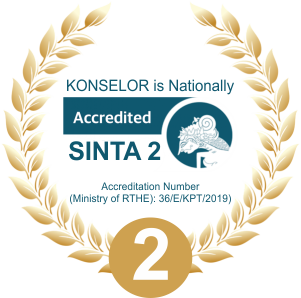The urgency of developing trust and interpersonal communication skills of students through role playing
 ),
), (1) Universitas Negeri Yogyakarta
 Corresponding Author
Corresponding Author
Copyright (c) 2018 Yulia Novita Sari
DOI : https://doi.org/10.24036/02018738684-0-00
Full Text:
 Language : id
Language : id
Abstract
Students as social beings cannot be separated from various activities that involve other people. Related to this need, interaction becomes a decisive part. The most important element in interacting is having good self-confidence and interpersonal communication skills. The problem of self-confidence and students’ interpersonal communication skills has become more widespread. Role playing is one of the right techniques used to overcome this problem. This technique aims to prepare students to take on the role of people, to develop insights about unspoken attitudes, thoughts, and feelings, which often determine the behavior of others, and to increase self-confidence and communication skills through student participation in implementing challenges communication faced. This text will explain how the urgency of developing self-confidence, and interpersonal communication can be developed through role playing.
References
Al-Salameh, E. M. (2011). Irrational beliefs among Jordanian college students and relationship with self-confidence. Asian Social Science, 7(5), 137.
Baile, W. F., & Blatner, A. (2014). Teaching communication skills: using action methods to enhance role-play in problem-based learning. Simulation in Healthcare, 9(4), 220-227.
Bowman, S. L. (2010). The functions of role-playing games: How participants create community, solve problems and explore identity. USA: McFarland.
Cangara, H. (2013). Perencanaan dan strategi komunikasi. Jakarta: Raja Grafindo Persada.
Corey, G. (2015). Theory and practice of counseling and psychotherapy. Nelson Education.
Corsini, Raymond. J. (2010). Role playing in psychotherapy. Transaction Publishers.
DeVito, Joseph A. (2013). The interpersonal communication book 13th ed. New Jersey: Pearson Education, Inc.
Effendy, Onong Uchyana. (2011). Ilmu Komunikasi: Teori dan Prakteknya, Bandung : Remaja Rosdakarya.
Erford, Bradlet T. (2015). 40 Techniques Every Counselor Should Know Second Edition. New Jersey: Pearson Education, Inc.
Fatimah. (2008). Psikologi Perkembangan. Bandung: Pustaka Setia.
Gaskill, Dennis. (2011). Confidence. (Online). Tersedia di: http://www.boogiejack.com/free-ebooks/download-ebooks/Confidence.pdf , diakses 17 April 2017
Ghufron, Nur & Rini R.S. (2011). Teori-Teori Psikologi. Yogjakarta: Ar-Ruzz Media.
Hakim, T. (2005). Mengatasi Rasa Tidak Percaya Diri. Jakarta: Purwa Suara.
Hurlock, E. B. (2012). Developmental Psychology: A Life-Span Approach. Jakarta, Indonesia: Erlangga.
Jackson, V.A. (2011). Teaching Communi-cation Skill Using Role-Play: An Experience-Based Guide For Educators. Journal of Palliative Medicine. 14 (6): 775-780.
Jalgaonkar, S. V., Sarkate, P. V., & Tripathi, R. K. (2012). Students perception about small group teaching techniques: Role play method and case based learning in pharmacology. Education in Medicine Journal, 4(2).
Joyce, B., Weil, M., & Calhoun, E. (2011). Models of Teaching (Model-Model Pembelajaran). Yogyakarta: Pustaka Pelajar.
Kleitman, S., & Moscrop, T. (2010). Self-confidence and academic achievements in primary-school children: Their relationships and links to parental bonds, intelligence, age, and gender. In Trends and prospects in metacognition research (pp. 293-326). Springer US.
Lauster, Peter. (2005). Tes Kepribadian. Jakarta: Bumi Aksara.
Lestari, Tri. (2015). Efektivitas Teknik Role Playing Untuk Meningkatkan Self Confidance (Kepercayaan Diri) Siswa (Penelitian Quasi Eksperimen Pada Siswa Kelas X SMA Negeri 1 Pangandaran Tahun Ajaran 2014-2015). Diss. Universitas Pendidikan Indonesia.
Osborn, D., & Costas, L. (2013). Role-playing in counselor student development. Journal of Creativity in Mental Health, 8(1), 92-103.
Poston, B. (2009). Maslow’s hierarchy of needs. surgical technologist, 41(8), 347-353.
Ramaraju. S. (2012). Phychological Perspective of Interpersonal Communication. Journal of Arts, Science, and Commerce.Vol 3. No. 4. pp68-73.
Rao, D., & Stupans, I. (2012). Exploring the potential of role play in higher education: development of a typology and teacher guidelines. Innovations in Education and Teaching International, 49(4), 427-436.
Siska, Sudardjo & Purnamaningsih, Esti Hayu. (2003). Kepercayaan Diri dan Kecemasan Komunikasi Interpersonal Pada Mahasiswa. Jurnal Psikologi. Vol. 9 No. 2 tahun 2003. (Online), http://jurnal.psikologi.ugm.ac.i d/index.php/fpsi/article/view/106/96, di akses tanggal 14 Oktober 2017.
Tolan, J. & Lendrum, S. (2001). Case Material and Role Play in Counselling Training. New York: Taylor & Francis e-Library.
Undang – Undang Nomor 35 tahun 2014 tentang Perubahan Atas Undang-Undang No.23 tahun 2002 tentang Perlindungan Anak
Wood, J. T. (2015). Interpersonal Communication: Everyday encounters. Nelson.
 Article Metrics
Article Metrics
 Abstract Views : 1380 times
Abstract Views : 1380 times
 PDF Downloaded : 313 times
PDF Downloaded : 313 times
Refbacks
- There are currently no refbacks.
Copyright (c) 2018 Yulia Novita Sari

This work is licensed under a Creative Commons Attribution 4.0 International License.







